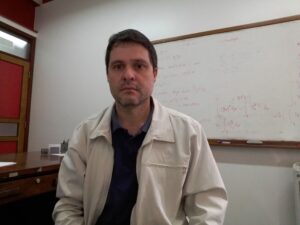Dynamical Systems
Dynamical Systems appear through all sciences as models for diverse types of phenomena such as the spread of diseases, the climate change system, and satellites’ positioning. Dynamical systems are generally described by ordinary differential equations (finite dimensions) or partial differential equations (infinite dimensions). However, they are also considered more general dynamical systems (maps, delay equations, stochastic aspects, etc.). The main objective of this area is to understand the asymptotic behavior of the system, given by a transformation or the flow of a differential equation and its orbits.
Ergodic theory is based on general notions of measure theory, and its initial development was motivated by problems in statistical physics. Until the end of the 19th century, the main approach in the study of dynamical systems was directed to solving analytical or numerical differential equations. Due to the existence of phenomena with chaotic behaviors (quite complicated), where sensitivity to initial conditions is a major obstacle in the studies addressed by the differential equations, H. Poincaré proposes the use of other tools and techniques. Among these tools, the study of dynamical systems using measure theory (providing invariant probability measures) has become the focus of the theory called “Ergodic Theory,” which provides a detailed description of dynamical behavior (even if chaotic), in statistical and probabilistic terms.
Research Lines
Complex Dynamics, Topological Dynamics, Symbolic Dynamics, Hyperbolic Dynamics and Chaos, Ordinary Differential Equations, Differentiable Flows and Topology of Strange Attractors, Piecewise Smooth Dynamical Systems, Ergodic Theory.
Researchers
 | Alexandre Miranda Alves Complex Dynamics: dynamic and geometric properties defined by the iteration of holomorphic applications defined on the Riemann Sphere, including the structure of the Julia and Fatou sets and the Mandelbrot set. Piecewise Smooth Dynamical Systems: the existence of invariant sets in Piecewise Smooth Dynamical Systems, such as homoclinic connections and limit cycles. Ordinary Differential Equations: the existence of limit cycles or centers in planar systems and Abel’s equations. |
 | Oscar Alexander Ramírez Cespedes Qualitative Theory of Systems of Smooth and Piecewise Smooth Ordinary Differential Equations, with emphasis on detection of limit cycles, structural stability of discontinuous fields, and bifurcations of minimal sets. |
 | Pouya MehdipourDynamical Systems with emphasis on Ergodic Theory and Hyperbolic Dynamics, specifically, the themes: Smale Horseshoe and Symbolic Dynamics for non-invertible transformations, Pesin Theory, and SRB measures for endomorphisms. |